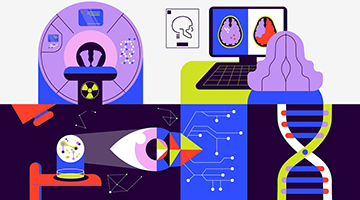-
AI competency framework for students

This publication aims to help educators integrating artificial intelligence learning objectives into official school curricula to prepare students to be responsible and creative citizens in the era of AI.
-
Ensure High-Quality Data Powers Your AI

AI does not need to fail on a global scale to cause enormous damage — to individuals, companies, and societies. Models frequently get things wrong, hallucinate, drift, and can collapse.
-
Augmented Course Design: Using AI to Boost Efficiency and Expand Capacity

Using generative artificial intelligence (GenAI) tools such as ChatGPT, Gemini, or CoPilot as intelligent assistants in instructional design can significantly enhance the scalability of course development.
-
Leveraging Generative AI for Inclusive Excellence in Higher Education

The hype and hesitation about generative artificial intelligence (AI) diffusion have led some colleges and universities to take a wait-and-see approach.
-
Augmented Course Design: Using AI to Boost Efficiency and Expand Capacity

Using GenAI tools like ChatGPT and Gemini in instructional design boosts course development efficiency and aligns content with curriculum goals. This article explores AI’s role in content creation, media development, and faculty support, offering ethical design suggestions.”
-
B.C.’s wildfires can only be met with a new era of innovation to fight them

BC’s wildfire crisis demands innovation. This article highlights the province’s efforts, including how UBC researchers are using AI-driven sensors to predict fire risks and develop new detection tools.
-
Minecraft Meets AI Research with PLAI

Join the Pacific Laboratory for Artificial Intelligence (PLAI) at UBC in an exciting new project that merges the excitement of gaming with AI research. Contribute to groundbreaking AI while playing Minecraft—are you ready for the adventure?
-
AI and ethics: Investigating the first policy responses of higher education institutions to the challenge of generative AI

Using key documents from the UN, EU, and OECD, this article addresses the ethical challenges of generative AI in higher education and explores universities’ initial global responses to these challenges.
-
Nudge Users to Catch Generative AI Errors

Using large language models to generate text can save time but often results in unpredictable errors. Prompting users to review outputs can improve their quality.
-
AI and Copyright: 3 Key Issues

Three critical copyright issues with generative AI: legal and ethical complexities in data ingestion, potential infringement by AI-generated outputs, and challenges in securing copyright for AI-created content.
-
A healthcare revolution

Five UBC medical breakthroughs powered by AI: a cancer survival prediction model, a cancer cell analysis app, early sepsis detection, machine learning for drug development, and a “smart glove” for stroke rehabilitation.
-
How to Integrate Cloud, Data, and AI Technologies — and Make Your Company More Adaptable

Building a strong, flexible “digital core” that integrates cloud, data, and AI technologies to serve as an interconnected foundation for your company is the key to future growth.
-
At the Crossroads of Innovation: Embracing AI to Foster Deep Learning in the College Classroom

Discover how AI is revolutionizing college classrooms by fostering deep learning and enhancing student engagement through personalized and interactive educational experiences.
-
TikTok users are more productive — and negative — when they use AI voice

Although AI voice enabled TikTok creators to produce longer videos and more videos per week, the sentiment of those videos were more negative.
-
The Bard goes digital: Emerging technologies and Shakespeare’s First Folio

This podcast discusses how UBC’s acquisition of Shakespeare’s First Folio is being enhanced by emerging technologies, including generative AI, to improve public access and interaction with the historic text.